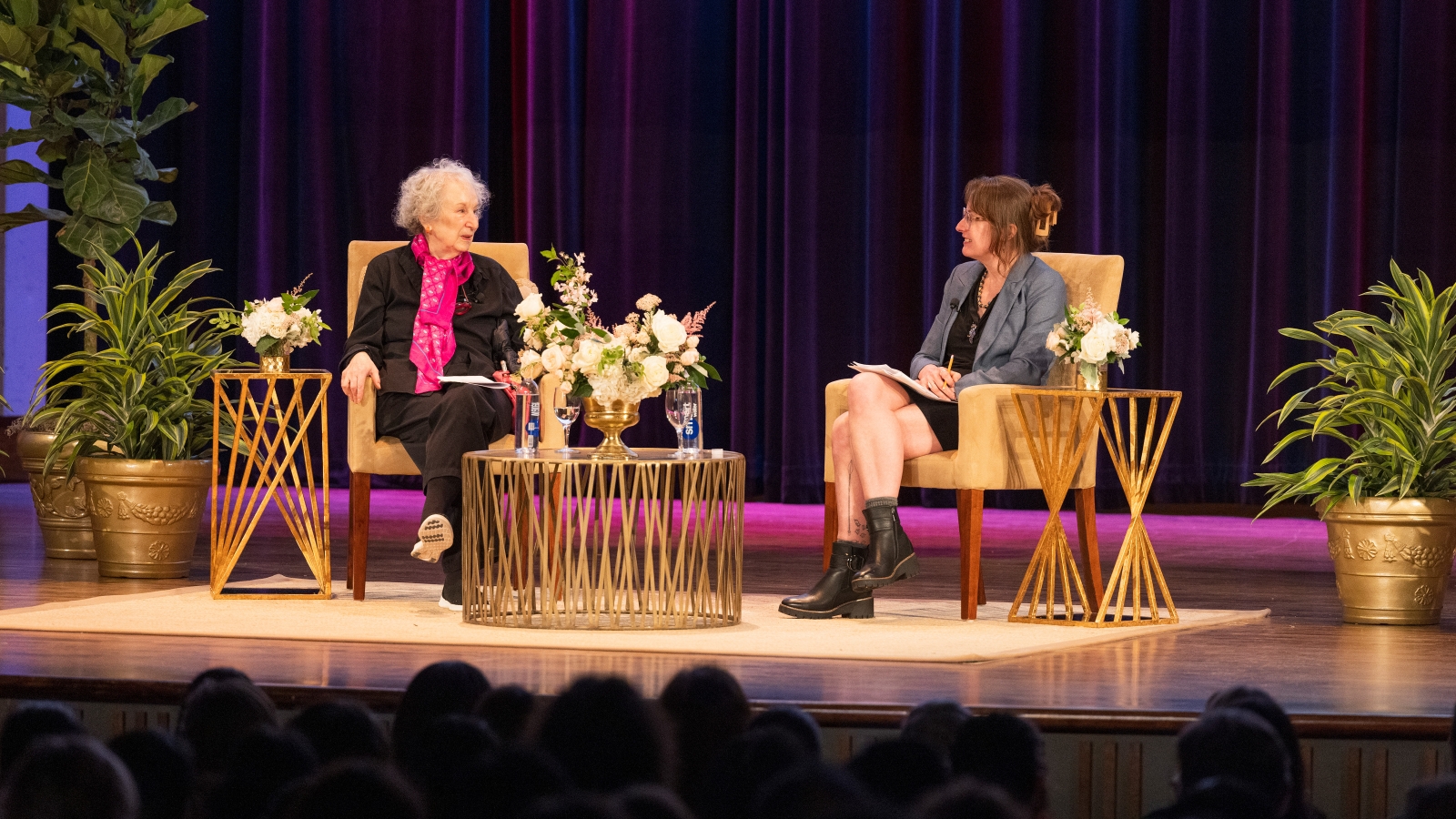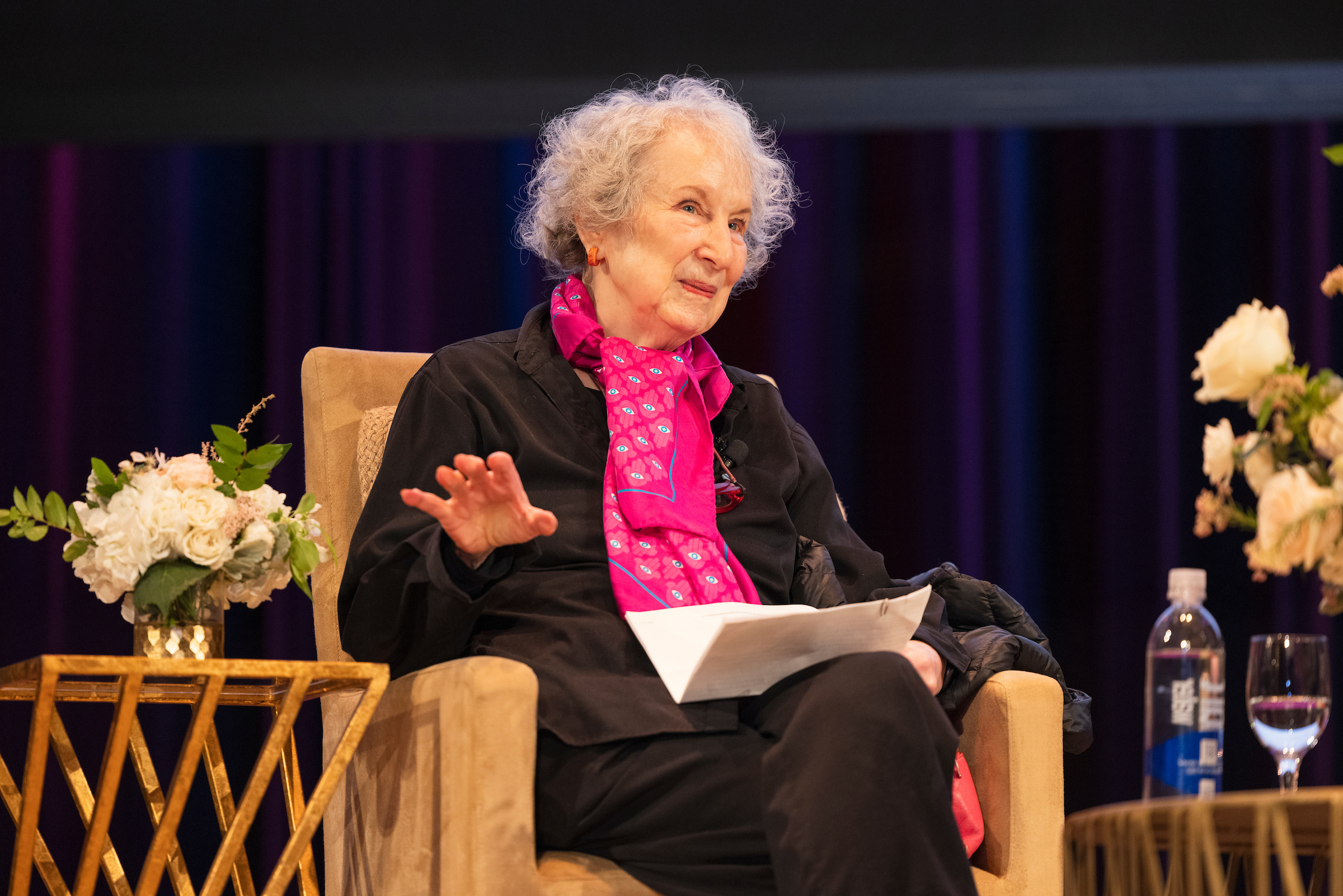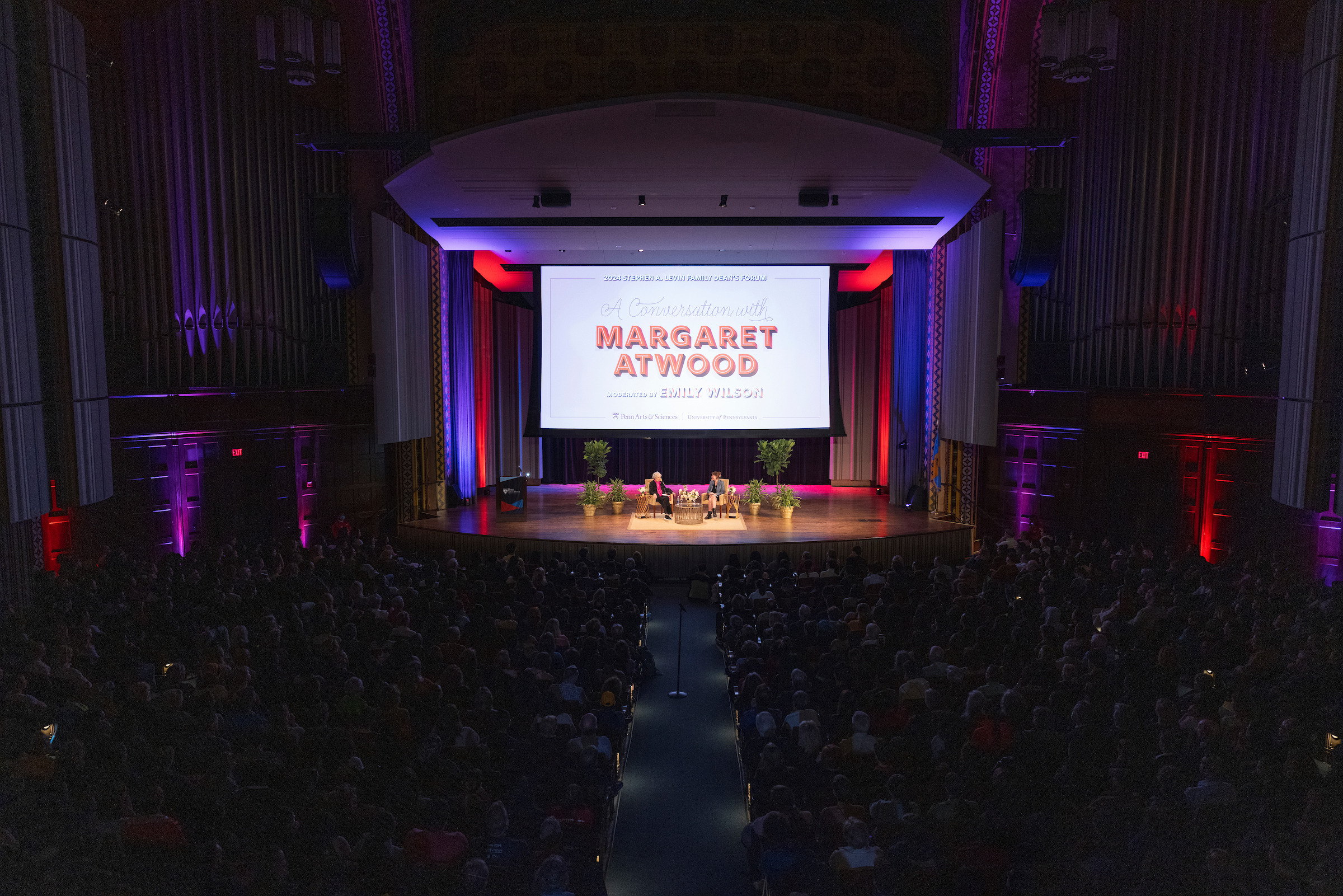Laughter may not be what you’d expect to hear during a conversation about dystopian societies between two literary lions. But laughter frequently filled Penn’s Irvine Auditorium during a discussion between author Margaret Atwood and classicist Emily Wilson before a capacity crowd.
Atwood and Wilson, College for Women Class of 1963 Term Professor in the Humanities in the Department of Classical Studies, spoke at length during the Stephen A. Levin Family Dean’s Forum on April 17 about writing, feminism, cultural history, and how Atwood’s acute observations have informed her imaginative works.
During her long career, Atwood has written more than 50 books, including fiction, nonfiction, poetry, essays, graphic novels, and children’s books, as well as television scripts, radio scripts, even a play. Her works have been published in more than 45 countries. Born in Canada in 1939, she started writing while in high school in the mid-1950s.
Atwood is best known for The Handmaid’s Tale, an enduring dystopian classic published in 1985, made into a movie in 1990, and into a Hulu television series in 2019. The sequel, The Testaments, was published in 2019. The books are set in the fictional Republic of Gilead, a totalitarian regime run by religious fundamentalists, an authoritarian patriarchy that has reduced women to objects of procreation.
Steven J. Fluharty, Dean and Thomas S. Gates, Jr. Professor of Psychology, Pharmacology, and Neuroscience, said in his introduction that Atwood is a “literary and cultural icon,” a writer whose work “pursues justice on many levels.” She has won numerous awards and her books have garnered many prizes during more than 60 years of writing.
The annual Arts & Sciences speaker series started in 1984 and has featured several well-known authors. Even so, the interest in the Atwood-Wilson combination exceeded expectations. Originally slated for the Penn Museum’s Harrison Auditorium, the free tickets were quickly claimed. Moved to Irvine Auditorium, the largest indoor space on Penn’s campus, more than 900 people filled the seats, and another 600 watched the livestream.
Students Honored as 2024 Dean’s Scholars
Penn Arts & Sciences named 20 undergraduate and graduate students as this year’s Dean’s Scholars, a recognition bestowed annually on students who exhibit exceptional academic performance and intellectual promise. They were celebrated at the Stephen A. Levin Family Dean’s Forum on April 17.
College of Arts & Sciences
Natascha Barac, C’23, English and Physics
Rema Bhat, C’24, Political Science
Sophie Faircloth, C’24, Linguistics, submatriculant in Linguistics
Andreas Ghosh, C’24, ENG,’24, Vagelos Integrated Program in Energy Research
Sophie Mwaisela, C’24, History
William (Zijian) Niu, C’24, Biochemistry, Chemistry, and Biophysics
Liam Phillips, C’24, Russian and East European Studies and Comparative Literature
William Stewart, C’25, Music
Yijian (Davie) Zhou, C’24, Philosophy and Psychology, submatriculant in Philosophy
College of Liberal and Professional Studies - Undergraduate Program
Joe Daniel Barreto, LPS’23, Bachelor of Applied Arts and Sciences
College of Liberal and Professional Studies - Professional Master’s Programs
Abigail P. Blyler, LPS’24, Master of Applied Positive Psychology
Graduate Division – Doctoral Programs
Adwaita Banerjee, Anthropology
Charlie Cummings, Physics and Astronomy
Cianna Z. Jackson, Classical Studies
Ryann Michael Perez, Chemistry
Rashi Sabherwal, Political Science
Timmy Straw, Comparative Literature and Literary Theory
Elena Gayle van Stee, Sociology
Christine Soh Yue, Linguistics
Oscar Qiu Jun Zheng, East Asian Languages and Civilizations
Wilson is known worldwide for her translations of Homer’s epics The Iliad in 2023 and The Odyssey in 2017. So, it was not a surprise when she started by asking Atwood to read from her 2005 novella, Penelopiad, about The Odyssey character Penelope and a Greek chorus of 12 enslaved maids.
In their discussion about writing, Wilson asked about Atwood’s “mastery of multiple forms,” noting her forays into different genres and forms of writing. “All things involve storytelling,” Atwood said, adding that she wrote her first story, about an ant, when she was 7 and enamored of the rural Canadian outdoors. “Language and storytelling are probably the oldest human technologies that we have, particularly language that has past and future tense.”
Why did she decide to become a writer? Wilson asked Atwood. “I didn’t really decide. I started doing it and it was more fun than anything else,” Atwood said. Her parents, she said, were “quite disappointed” she didn’t become a botanist: “I could be cloning your potatoes right now.”
And how is she so productive? “The first thing you have to do is live for a very long time,” Atwood said. And when she struggles with writing? “It helps to be ambidextrous, so that when you get stuck in one thing, you can turn to another.” She has written in nearly every form, which Atwood acknowledged is unusual. “Nobody told me not to,” she said.
What you can “get away with” in pushing boundaries as an artist, Atwood said, “is going to be different from age to age,” adding, “I was never too worried about boundaries.” She urged those who write to write what they choose. “The first allegiance of an artist is to their art,” she said.
When asked about characterization and voice, Atwood described using first, second, and third person in writing. She wrote the first 100 pages of her 1996 novel Alias Grace in the third person, but that choice “turned out to be wrong,” she said. “Because the third person could know a bunch of things that the first person would not have known,” she said. The first-person narrator can be “quite dishonest with the reader,” which can be valuable in the telling of a tale.
“I write first, and I research later,” Atwood said, because “if you do too much research first, you can get very bogged down.”
Wilson asked about the authoritarian future, past, and present and how they have shifted since the 1980s when Atwood wrote The Handmaid’s Tale hunting and pecking on a German-language typewriter. “I don’t make predictions. I look at possibilities, which is a different thing. I’m not saying this will happen. I’m saying this is how it would happen, if it did happen,” Atwood said.
Asked if she would go back and revise her earlier work to make it more relevant today—like her first novel, The Edible Woman published in 1969—Atwood said no. “I think it’s cheating,” she said. “It would be like falsifying historical documents.” Plus, she added, they are a snapshot of the cultural context in which they were created, in the case of that first novel, a time before pantyhose and the birth control pill.
In today’s moment, that means many of Atwood’s titles have been banned—which ironically benefited her book sales, she said. She suggested billboards should advertise them as “too hot to read,” again invoking laughter from the crowd.
Wilson acknowledged Atwood’s intrinsically humorous way of talking about her views and experiences. “You’re so good at harnessing good humor to tell these terrible truths,” Wilson said. “One of the things I love most about your writing is that you are so good at integrating things that are very, very funny alongside these things that are horrifying and dystopic.”
When the topic turned to feminism, Atwood referenced “Rosie the Riveter,” and lifted her arm to make a muscle like the iconic World War II image. When feminism arrives in the 1960s and 1970s, Atwood said she thought, “Where have you been all my life?”
The Handmaid’s Tale was a creation of the 1980s, the religious-right energized as a political force, turning back the cultural clock with the 1950s message that “women belong in the home.” Atwood said she asked herself: “How do you do that? That’s the question.” If the United States became totalitarian, what would that be like? She looked to 17th-century New England, she said, where her ancestors came from. To create Gilead, she said, “I delved into them.”
The Hulu television series came about because someone finally found the television rights in an old filing cabinet. Filming started in 2016 during the presidential campaign. “Although we changed nothing, the frame changed, the way people were going to view this changed radically,” going from something that came from someone’s imagination to something that seemed possible, she said.
After that presidential election, she started writing the sequel, The Testaments, even though previously she said she wouldn’t do one. “Things had changed,” she said. “Now I wanted to explore a world about 15 years later, because these regimes tend to collapse from within.”
“Like in Handmaid’s Tale, I put nothing in that did not have a precedent in real life,” Atwood added. “It’s not me who comes up with this. It’s the human race.”
As applause filled the auditorium at the close, Wilson took Atwood’s hand and raised their arms up together, doing a spontaneous twirl. More applause, more laughter as the literary lions left the stage.





